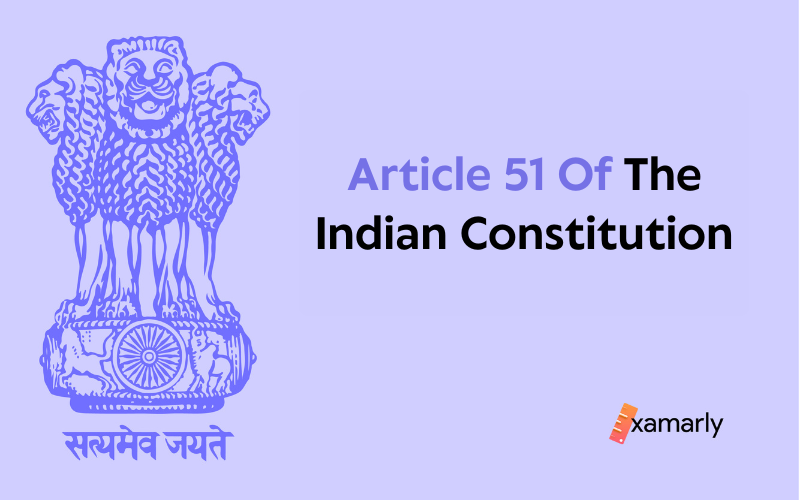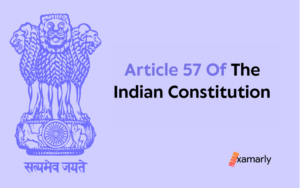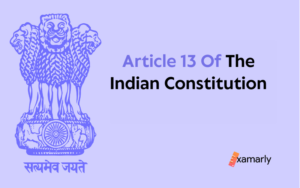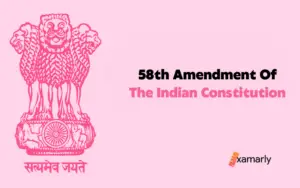India has the largest and widest constitution in the world. The rights of every person are upheld during this procedure. Therefore, citizens are required to carry out a number of fundamental duties stated in Article 51 of the Indian Constitution.
The fundamental obligations that our nation’s citizens are obliged to fulfill are covered in this article. Maintaining a sense of patriotism and solidarity among all countrymen is a moral obligation on the part of the populace.
- Article 51 Of The Indian Constitution
- Article 51a Of The Indian Constitution ( Fundamental Duties)
- What Is The Need For Fundamental Duties?
- Sources Of Fundamental Duties
- Importance Of Fundamental Duties
- Enforcement Of Duties
- Swaran Singh Committee
- AIIMS Students Union v. AIIMS, AIR 2001 SC 3262
- Aruna Roy v. Union of India, AIR 2002 SC 3176
- Criticism
- Conclusion
- FAQs
- Which Fundamental Duty Was Added By The 86th Amendment Act?
- Fundamental Duties Are Added Under Which Part Of The Indian Constitution?
- Which Committee Proposed To Add Fundamental Duties In The Indian Constitution?
- Which Amendment Act Added 10 Fundamental Duties To The Indian Constitution?
- Which Fundamental Right Is Unassailable?
- Is Article 51A Enforceable?
- Which Two Amendments Make UP The Fundamental Duties?
Article 51 Of The Indian Constitution
For the benefit of the whole human species, Article 51 of the Indian Constitution stands as a symbol, expressing a real resolve to uphold global peace and security by averting conflicts and wars.
According to the Article, the State shall make every effort to
(a) promote international peace, harmony, and safety.
(b) maintain fair and honourable relations amongst countries.
(c) in the interactions of organised people, foster respect for international law and treaty obligations,
(d) advocate the use of arbitral proceedings to resolve international issues.
Article 51a Of The Indian Constitution ( Fundamental Duties)
Our Constitution has given us many privileges and demands that we fulfill certain obligations in return. These have been discussed in Article 51(A). It lists 11 fundamental obligations on citizens.
These are:
- to abide by the Constitution of India and honor its objectives and institutions, the National Flag, and the National Anthem;
- to uphold and adhere to the great values that fueled our country’s quest for freedom;
- to safeguard and uphold India’s sovereignty, unity, and integrity;
- to protect the country and provide national service as required;
- to foster peace and a sense of brotherhood among all Indians, notwithstanding their differences in religion, language, and regional or sectional diversities, and to condemn practises that are derogatory to women’s dignity;
- to cherish and safeguard the rich heritage of our diverse culture;
- to safeguard and enhance the natural environment, including forests, lakes, rivers, and wildlife, and to have respect for all living things;
- to develop a scientific temper, humanism, and the spirit of inquiry and reform;
- to refrain from violence and to safeguard public property;
- to strive for excellence in all spheres of life of individual and collective activity, so that the country is always striving for greater levels of venture and achievement;
- To his ward or child between the ages of 6-14 years, provide opportunities for education. The 86th Constitutional Amendment Act of 2002 added this duty.
What Is The Need For Fundamental Duties?
People from different castes, creeds, religions, sects and other groups coexist in India, and observing the Fundamental Duties on their part plays a critical role in upholding and safeguarding our country’s sovereignty, unity, and integrity, which are of paramount importance. It serves as a reminder to citizens that obligations and rights are intertwined.
The need for fundamental duties is as follows:
- Maintain Sovereignty of State – Upholding our state’s sovereignty was the major goal of the insertion of fundamental obligations. Despite the fact that they cannot be legally implemented, these also provide our state with a certain amount of sovereign power.
- To uphold the nation’s unity and integrity – We must fulfill our fundamental duties, which promote tolerance among citizens of Indian society and, in turn, a sense of national cohesion and integrity.
- Aid in the explanation and understanding of the laws and statutes created by the legislature in the various statutes – In many instances, it is believed that the need for Fundamental Duties in determining how to interpret Fundamental Rights. The court ruled that statutes made in accordance with Article 51(A) of our Constitution are lawful in Mohan Kumar Singhania v. Union of India. Thus, Fundamental Duties aid in deciphering the constitutional provision.
- Crucial to strike a balance between individual citizens’ expectations and the development of civil society – To achieve this balance between their claims and those of the latter, it is crucial to educate our nation’s citizens about their civic and social responsibilities in order to fulfill this goal. Additionally, by doing this, we will ultimately shape civic society.
- Need in the current scenario – Earlier, there was no need to impose any moral or legal obligations on the citizen to uphold secularism, patriotism, harmony, or any other value because these feelings were innate. The people of the country had a strong sense of duty to serve and protect their nation at all costs. Although the populace was eager to preserve the rich heritage of Indian culture, doing so is now difficult. Thus, it is necessary.
Sources Of Fundamental Duties
The USSR (Russia) constitution is where the fundamental obligations come from. Our constitution has become more in line with numerous sections of other nations’ modern constitutions as well as with Article 29(1) of the Universal Declaration of Human Rights thanks to the inclusion of fundamental duties.
For Further Readings:
Importance Of Fundamental Duties
The importance of Fundamental Duties are as follows:
- Fundamental duties tell us that we should not forget about our national duties while enjoying our fundamental rights.
- These duties are an alert signal against any type of antisocial activity.
- This gives a chance to the people to have active participation in society instead of being a spectator.
- These duties promote a discipline of citizens towards society.
- Fundamental duties are being used by courts for determining the constitutionality of the law.
Enforcement Of Duties
- Constitutional obligations that must be upheld by the law are fundamental duties.
- Due to the fundamental nature of the duties, there is no legal recourse for its violation.
- It is crucial to understand that only citizens in positions of public trust may enforce Fundamental Duties.
- It is possible through departmental codes of behavior and by enacting the necessary laws.
- For the violation of Fundamental Duties in Public Offices, appropriate sanctions exist.
- In many regions of India, a person in a position of public trust may be denied departmental promotions as well as raises.
Swaran Singh Committee
The Sardar Swaran Singh Committee was established by the Congress Party in 1976 to give suggestions regarding fundamental obligations. It was thought that they were needed and necessary during the handling of the internal situation.
The committee proposed adding a section on essential obligations to the Constitution. It emphasized the need for citizens to understand that in addition to enjoying their rights, they also have obligations to fulfill.
These suggestions were adopted by the central Congress administration, which in 1976 passed the 42nd Constitutional Amendment Act. Part IVA, a new section, was added to the Constitution as a result of this modification.
This new section only has one article, Article 51A, which for the first time outlined a code of ten fundamental duties of citizens.
AIIMS Students Union v. AIIMS, AIR 2001 SC 3262
To gain admission into the esteemed medical science institute, three meritorious students in this case of AIIMS Student Union filed a writ petition to the Delhi High Court.
33% of the seats in this institution were reserved for graduates of the institution itself. The question posed was whether AIIMS has the authority to grant the pupils such a reservation. Here, the Supreme Court ruled that the AIIMS’s actions were unconstitutional and deemed it irrational to reserve a place for the college student themselves.
The Supreme Court ruled unequivocally in this case that even while the Fundamental Duties may not be upheld by a court order, they still serve as an important reference for interpreting the relevant constitutional provision. In this instance, the State (which includes the people of our nation) failed to fulfill a fundamental responsibility, namely, to work toward individual and collective excellence for the benefit of the country. The obligation of each person became the collective activity of the State, even though the Fundamental Duties do not explicitly impose any duty on the State.
Aruna Roy v. Union of India, AIR 2002 SC 3176
A PIL was submitted to the Supreme Court in the well-known case of Aruna Roy v. Union of India. It has been argued that the Central Advisory Board of Education (CABE) was not consulted before the National Curriculum Framework for School Education (NCFSE), which was released by NCERT, violated constitutional mandates and was anti-secular. NCFSE’s implementation faced difficulties because CABE did not approve it. NCFSE was also determined to be in violation of the constitution since it went against the fundamental tenet of secularism.
However, the Supreme Court dismissed the petition because it did not see any justification for doing so (NCFSE). Our constitution stipulates that schoolchildren should be taught that all religions are common and equal. Additionally, Article 51A (e) defines this circumstance in detail. This fundamental obligation states that it is the responsibility of the citizen to encourage peace and goodwill among those who practice various religions. And the base of education should be ethical conduct, love, truth, and peace in order to realize these universal values.
Criticism
- Some important duties like voting, paying taxes, and family planning, are not included.
- Sometimes the duties mentioned are complex and tricky for the ordinary citizen to comprehend.
- Critics contend that the Constitution’s sense of morality is unnecessary since the people would still carry out these specific duties even if the Constitution didn’t include them.
- Some of the duties were termed as unjust.
- The list of duties provided is not exhaustive.
Conclusion
The Indian Constitution’s Article 51 is unquestionably a unique provision that supports a great Indian philosophy and acts as a beacon for world peace and security.
All rights are human necessities because they can safeguard us in times of complexity and adversity and help us grow into morally upright individuals.
FAQs
Which Fundamental Duty Was Added By The 86th Amendment Act?
The Fundamental Duty added by the 86th amendment act directs citizens to provide chances for education for children between the age of six and fourteen years.
Fundamental Duties Are Added Under Which Part Of The Indian Constitution?
Fundamental duties have been added under Part-IV-A of the Indian Constitution.
Which Committee Proposed To Add Fundamental Duties In The Indian Constitution?
The Swaran Singh Committee suggested adding fundamental duties to the constitution in 1976.
Which Amendment Act Added 10 Fundamental Duties To The Indian Constitution?
42nd Amendment Act, 1976 added 10 Fundamental Duties.
Which Fundamental Right Is Unassailable?
Unassailable fundamental rights are those guaranteed by Articles 20 and 21. Article 20 offers protection from a criminal conviction, and Article 21 offers protection for one’s life and individual liberties. In the event of a national emergency, they cannot be suspended.
Is Article 51A Enforceable?
The claim that Article 51A’s Fundamental Duties are merely a reminder and cannot be enforced to ensure compliance is no longer true. There is a requirement for compliance with these basic responsibilities.
Which Two Amendments Make UP The Fundamental Duties?
10 Fundamental Duties under Article 51 A are laid down by the 42nd amendment act. Later on, the 86th amendment brought the amendment of Article 51 A, thereby adding the 11th fundamental duty to it.






